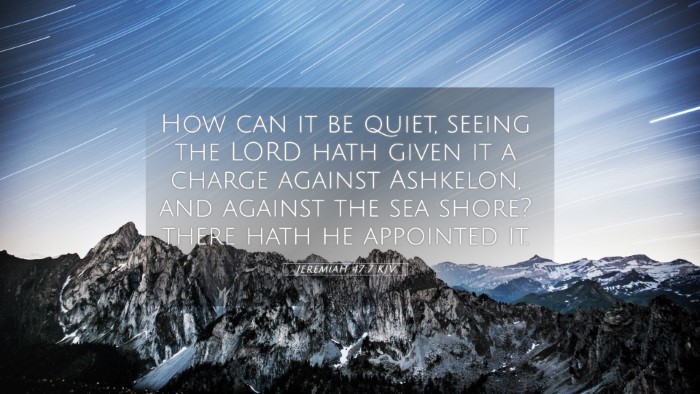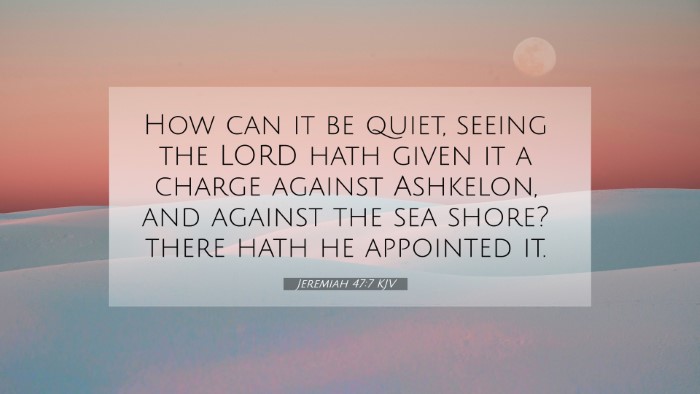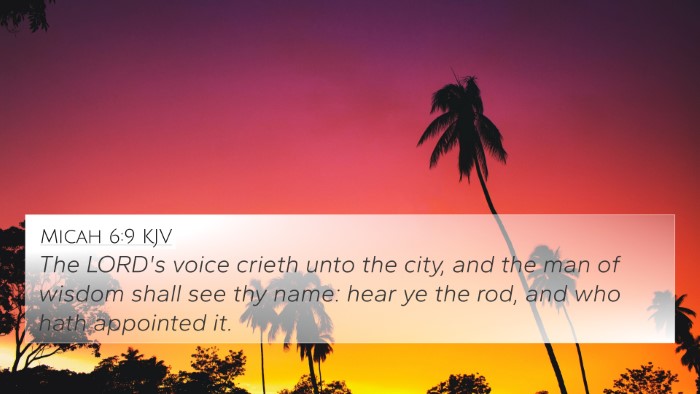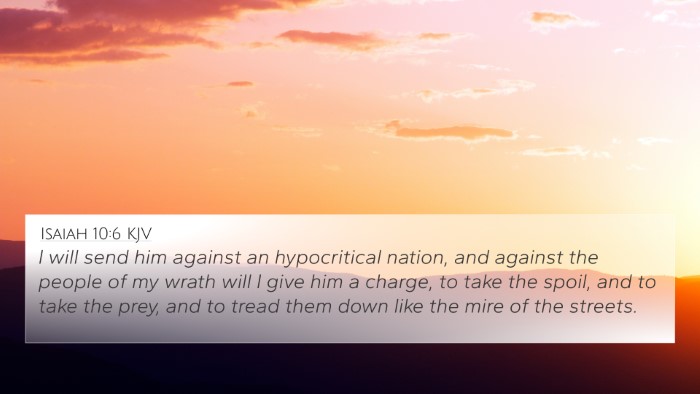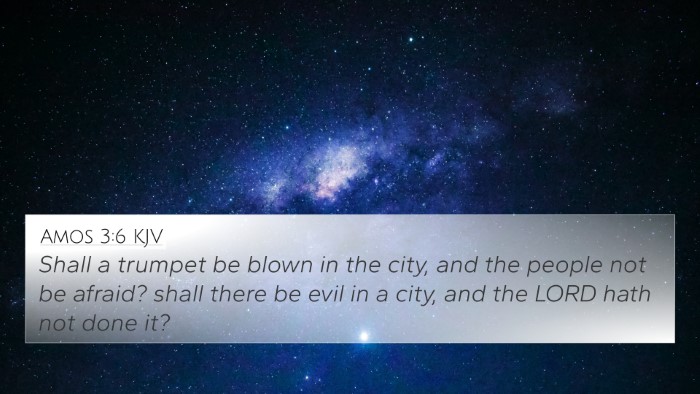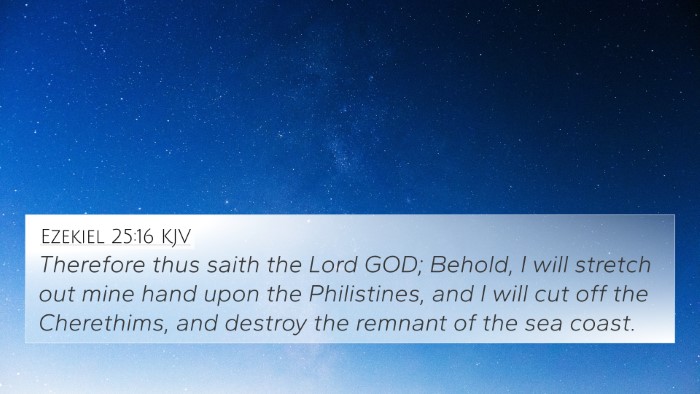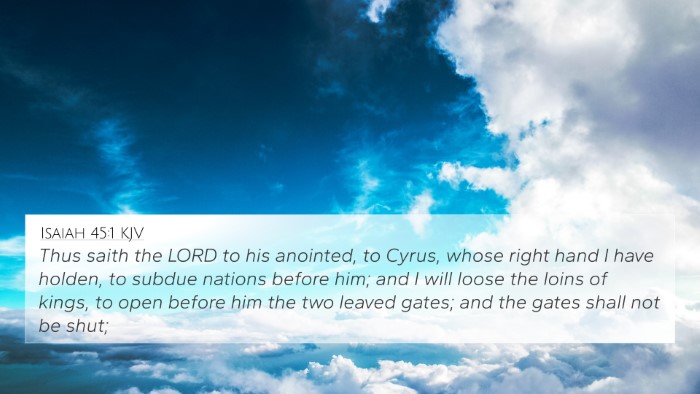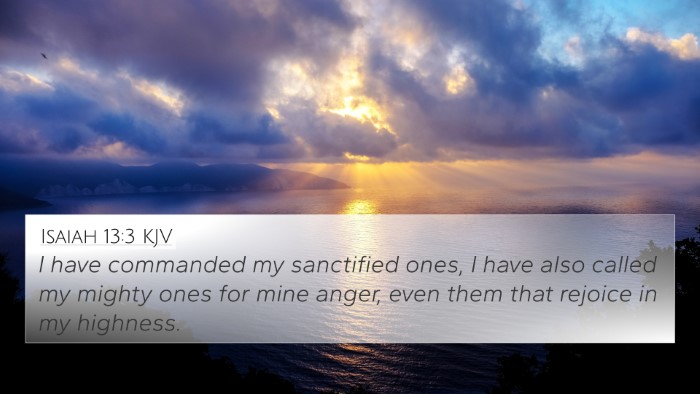Understanding Jeremiah 47:7
Verse: Jeremiah 47:7 – "How can it be quiet, seeing the LORD hath given it a charge against Ashkelon and against the sea shore? there hath he appointed it."
Summary of Meaning:
This verse occurs in the context of a prophecy concerning the Philistines and specifically addresses the impending judgment against Ashkelon, one of the chief cities of the Philistines. The imagery here suggests an unstoppable and powerful force, illustrating God's sovereignty in deploying judgment against nations that have strayed from His commands.
Commentary Insights
Matthew Henry's Commentary
Matthew Henry emphasizes that the Lord has given charge over the Philistines, specifically highlighting Ashkelon and its coastal territories. He notes that the mention of the 'sea shore' indicates the vast and uncontrollable nature of the impending judgment. Henry also reflects on God's purpose in these judgments, noting them as a means of bringing accountability to nations that experience divine moral displeasure.
Albert Barnes' Notes
Albert Barnes elaborates on the notion that the Lord has set a mandate for the destruction against Ashkelon and its surroundings. He interprets the quietness in the face of looming disaster as a moment when divine intervention is still necessary. Barnes firmly establishes the connection between God's will and the consequential actions against nations like Ashkelon.
Adam Clarke's Commentary
Adam Clarke delves into the metaphorical aspects of this verse, highlighting Ashkelon’s historical significance. He observes the mindset of those experiencing judgment, where their peace is disrupted by God's decrees. Clarke further examines the geographical implications, indicating how Ashkelon's position on the sea makes it susceptible to divine acts of judgment that reflect God's omnipotence.
Cross-References Related to Jeremiah 47:7
- Isaiah 14:31: A similar proclamation of distress for the Philistines, showcasing divine judgment.
- Ezekiel 25:15-17: This passage also speaks of God's judgment upon the Philistines, affirming His control over nations.
- Zephaniah 2:4: Describes the judgment against Philistine cities, echoing themes of accountability to God’s commands.
- Amos 1:8: Recognizes the fate of Ashdod, another Philistine city, linking prophetic warnings across texts.
- Jeremiah 46:8: Another call to judgment, emphasizing God's power against nations that oppose Him.
- Joel 3:4: Similar calls for accountability concerning nations, reinforcing the theme of divine justice.
- Acts 4:25-26: New Testament reflections on the unity of the nations against God’s anointed, tying back to Old Testament themes.
Connections Between Bible Verses
This verse invites readers into deeper reflections on God's overarching authority, the interconnectedness of prophetic literature, and the moral expectations placed upon nations.
Thematic Bible Verse Connections
See how Jeremiah 47:7 aligns with the themes of divine judgment, sovereignty, and the historical consequences for both Israel and surrounding nations. These connections can enhance understanding through systematic cross-referencing, allowing for improved study tools and resources.
Conclusion
In analyzing Jeremiah 47:7, we grasp the serious implications of God’s message regarding Ashkelon and the Philistines. Through cross-referencing biblical texts and drawing connections, we uncover the rich tapestry of divine narrative and warning that spans across both Old and New Testament scriptures.

